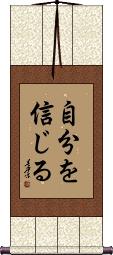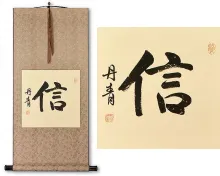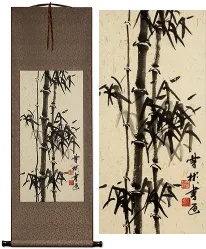Many custom options...
And formats...

Believe in Yourself in Chinese / Japanese...
Buy a Believe in Yourself calligraphy wall scroll here!
Personalize your custom “Believe in Yourself” project by clicking the button next to your favorite “Believe in Yourself” title below...
Believe in Yourself
自分を信じる means “believe in yourself,” “have faith in yourself,” or “believe in myself” (can be myself or yourself depending on if you're saying it to yourself or someone else).
Note: Because this selection contains some special Japanese Hiragana characters, it should be written by a Japanese calligrapher.
Believe in Yourself
This in-stock artwork might be what you are looking for, and ships right away...
Gallery Price: $65.00
Your Price: $39.88
Gallery Price: $130.00
Your Price: $69.88
Not the results for believe in yourself that you were looking for?
Below are some entries from our dictionary that may match your believe in yourself search...
| Characters If shown, 2nd row is Simp. Chinese |
Pronunciation Romanization |
Simple Dictionary Definition |
眼見為實,耳聽為虛 眼见为实,耳听为虚 |
yǎn jiàn wéi shí , ěr tīng wéi xū yan3 jian4 wei2 shi2 , er3 ting1 wei2 xu1 yen chien wei shih , erh t`ing wei hsü yen chien wei shih , erh ting wei hsü |
to believe what one sees, not what one hears (idiom). Don't believe what people tell you until you see if for yourself.; It ain't necessarily so. |
The following table may be helpful for those studying Chinese or Japanese...
| Title | Characters | Romaji (Romanized Japanese) | Various forms of Romanized Chinese | |
| Believe in Yourself | 自分を信じる | jibun o shinjiru jibunoshinjiru | ||
| Believe in Yourself | 相信自己 | xiāng xìn zì jǐ xiang1 xin4 zi4 ji3 xiang xin zi ji xiangxinziji | hsiang hsin tzu chi hsianghsintzuchi |
|
Successful Chinese Character and Japanese Kanji calligraphy searches within the last few hours...








